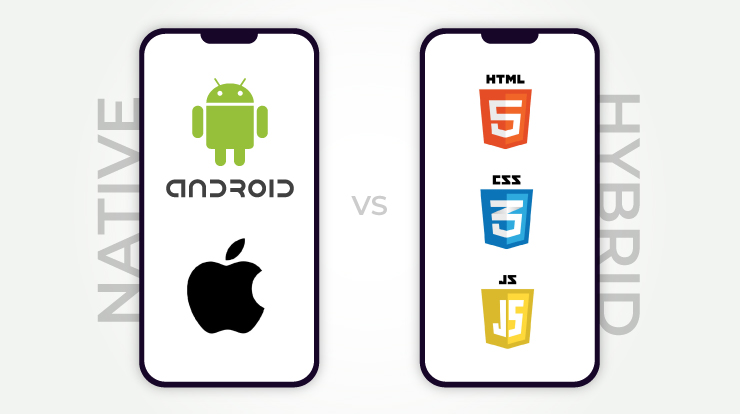

Success in the present competitive landscape is getting harder by each day. Regardless of what the size and scope of your project is, in order to excel, you need to be in touch with the latest technology and capable of choosing the best options for your business.
Picking a native app or hybrid one is basically close to what Sophie’s choice was, the only difference is the latter was a movie with literally no repercussions in real life.
Let us take a look at both of the options :
What are native applications ?
Whenever we think of downloading an application for our device from Apple Store, Google play, those are the ‘ native apps ‘ we resort to download. These applications are developed for one platform making them compatible with that one platform only.
Since these applications are platform specific i.e. Java, Kotline are used to develop applications for Android, Apple Swift, Objective-C, SDK are used to develop apps for iOS and .NET for windows. These are very particular in nature and won’t run on other devices than the one they are being developed for.
The reason why these are so popular is because of the number of features that comes with putting native apps in use. They take full advantage of the devices on which these are downloaded. They exploit devices features i.e camera, microphone, contact list, geo location, accelerometer, notification system and also can work offline.

ADVANTAGES
- Better Performance
- Data Protection
- Quality overall function
- Higher Customer Experience
- UX/UI is exceptional

DISADVANTGES
- Distributed Codebase
- Expensive Process
- Time Consuming
What are Hybrid Applications ?
Hybrid means something heterogenous in origin or its composition. Similarly, hybrid applications are those which is literally a composition of web apps as well as native apps. They offer native-app like performance but are developed using web technologies.
These applications are developed using web technologies i.e. Javascript, HTML 5, CSS but incorporates native app features by using Cordova, Ionic Capacitors etc. Instead of creating two different apps for two different platforms, hybrid apps overcomes that hurdle by providing a one stop solution. By incorporating these, you can easily have access to your app at almost any platform.
Its features are that it targets multiple mobile platforms, provides features like geo location, accelerometer or the camera, doesn’t require the advanced graphics performance that you can only get from a native app and can be used in offline mode.

ADVANTAGES
- Single Code Base
- Lesser Costs
- Simplified building & testing
- Low maintenance costs
- Faster delivery time
- Access to more device features

DISADVANTGES
- Internet at all times
- UX/UI suffers
Basically, both types of applications come with certain limitations and advantages, the only part you have to factor in is what your needs are and which app options serves its purpose. And if you keep these two aspects in mind, it won’t seem like rocket science anymore.

Speed of Application
The speed of accessing the application is only compromised by the mobile’s own shortcomings. Native application provides unlimited speed and facilitates smooth running of the application.
UX/UI Features
Since native apps are platform specific, there are particular UX/UI guidelines that every app launched on that app needs to follow in order to be introduced on that platform. Because of this pre requisite, native apps provide a high quality UX/UI features than hybrid ones. Graphical Applications, HD games, intensive animation perform better in native apps.
Complex Features
Native apps provide simplification of features when building an app, since it is for that one specific platform. on the other hand, hybrid apps main purpose is to target multiple platforms because of which there’s a limit to how much we can simplify its usage.
Budget
Native app requires you to write a code from scratch for every platform that you want to introduce it on. While for hybrid, you can write just on code which will work on all platforms. So the former one is less cost effective than the latter.
Purpose of the app
Based on what the purpose of you application really is and whichever option caters to your need the most, is the best option for your app.
Conclusion
You require a very systematic and practical approach to the process of your mobile applicationsMobile app development. Whichever option you go for, make sure it is very well thought out and matches all your needs and requirements.
